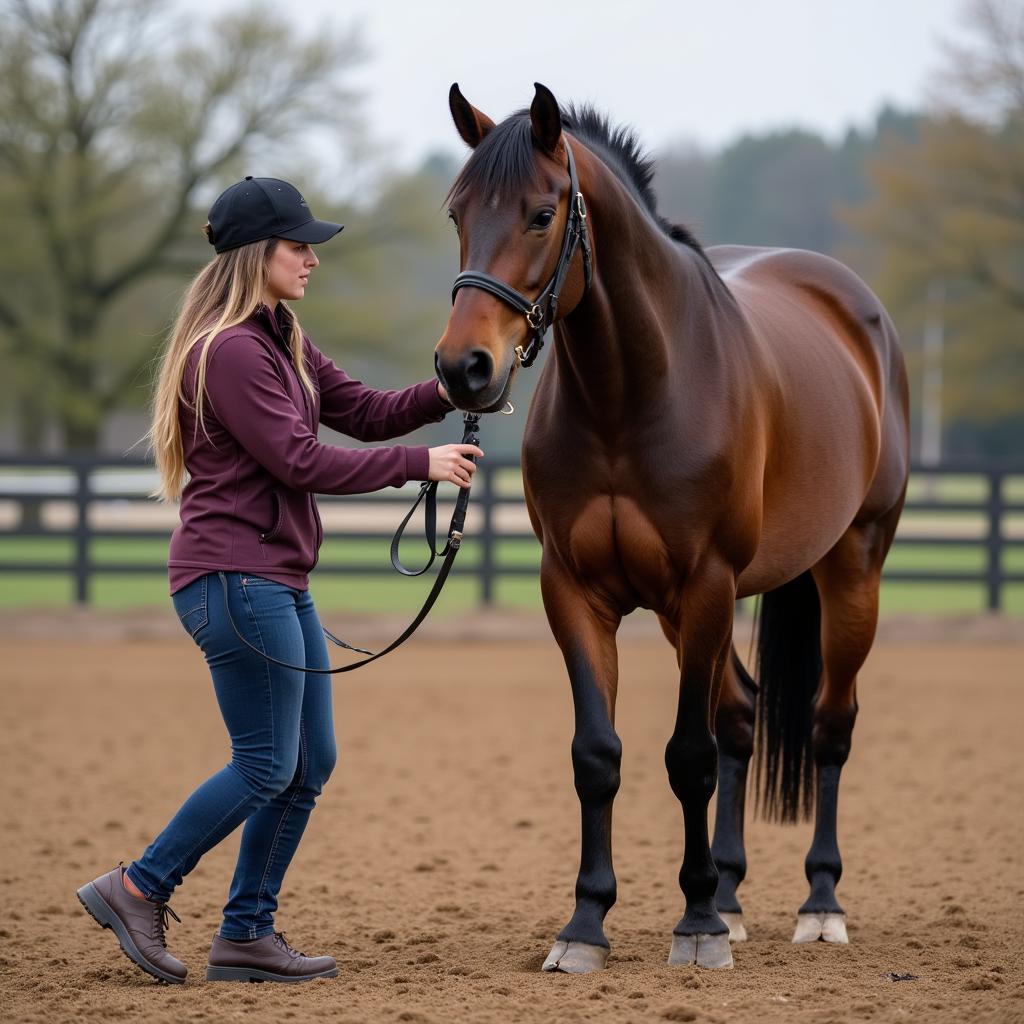The term “Madcap Horse” might conjure images of a wild, untamable beast, but the reality is far more nuanced. While some horses possess naturally spirited temperaments, labeling a horse as simply “madcap” often oversimplifies a complex issue rooted in a variety of factors, including breed, upbringing, training, and even underlying health conditions.
What Makes a Horse “Madcap”?
It’s important to differentiate between a horse with a naturally energetic personality and one exhibiting genuinely problematic behavior. A “madcap” horse is typically characterized by:
- High Energy Levels: These horses are often described as “hot-blooded,” possessing an abundance of energy and a strong flight response.
- Sensitivity and Reactivity: They may startle easily, react intensely to new stimuli, or be more prone to spooking.
- Independent Nature: These horses might be less naturally inclined to follow a leader and may display a stronger will than their more laid-back counterparts.
However, it’s crucial to remember that these traits alone do not make a horse “bad” or unmanageable.
Decoding the Behavior: Nature vs. Nurture
While genetics undoubtedly play a role in a horse’s temperament, upbringing and training have a profound influence.
- Breed Predispositions: Certain breeds, like Thoroughbreds and Arabians, are known for their energetic and sensitive natures. This doesn’t mean all horses within these breeds will be “madcap,” but understanding breed tendencies can offer valuable insights.
- Early Handling: Horses handled consistently and calmly from a young age are more likely to develop trusting relationships with humans and be less reactive.
- Training Methods: Harsh or inconsistent training can create fear and anxiety in a horse, leading to behavioral problems that might be misconstrued as “madcap” behavior.
 Horse and Trainer Working Together
Horse and Trainer Working Together
Managing the “Madcap” Horse: A Holistic Approach
Addressing perceived “madcap” behavior requires a multi-faceted approach:
- Expert Evaluation: Consult a qualified equine veterinarian and a certified trainer or behaviorist. They can help rule out any underlying medical conditions and develop a safe, effective training plan.
- Appropriate Exercise: Providing ample opportunity for turnout, free movement, and engaging exercise is essential for managing a horse’s energy levels and reducing anxiety.
- Consistent Training: Clear communication, consistent boundaries, and positive reinforcement are crucial for building trust and confidence.
- Patience and Understanding: Remember that training takes time and every horse learns at its own pace. Celebrate small victories and remain patient throughout the process.
Finding the Right Fit: Rider and Horse Compatibility
Not every horse is a good match for every rider. A “madcap” horse requires an experienced handler who can provide consistent leadership and understand their unique needs. Inexperienced riders may find these horses overwhelming, while skilled riders who enjoy a bit of spirit may find them to be willing partners.
Madcap, Misunderstood, Magnificent
Instead of viewing “madcap” as a negative label, it’s important to recognize the potential within these spirited horses. With proper care, training, and understanding, they can become exceptional partners, excelling in disciplines that require athleticism, sensitivity, and a touch of that signature spark.
Remember, labeling a horse is rarely the answer. By focusing on individual needs, responsible horsemanship, and a commitment to clear communication, we can help all horses thrive.
FAQs About “Madcap” Horses
Q: Can a “madcap” horse ever become a safe riding horse?
A: Absolutely! With proper training, patience, and consistency, “madcap” horses can become reliable partners.
Q: Are certain disciplines better suited for “madcap” horses?
A: Disciplines that require athleticism and sensitivity, such as eventing, jumping, or even some Western riding events, can be a good fit for these horses.
Do you need help with your Madcap Horse?
Contact us at Phone Number: 0772127271, Email: [email protected] Or visit us at QGM2+WX2, Vị Trung, Vị Thuỷ, Hậu Giang, Vietnam. We have a 24/7 customer support team.